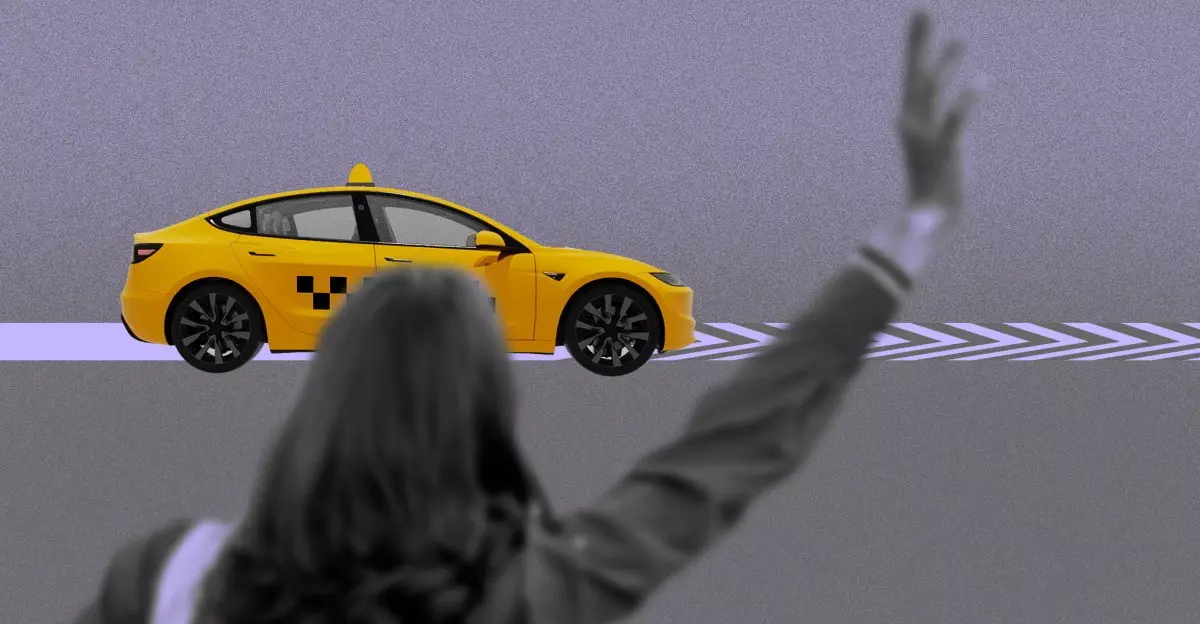In the high-octane world of technology, few names resonate as loudly as Tesla. The recent launch of its robotaxi service in Austin, Texas, however, revealed an unsettling truth about its media relations strategy. Instead of opening the doors to a diverse array of journalists and critics, Tesla opted for a carefully curated audience of influencers and loyal supporters. This decision not only stifled critical discourse but also allowed the company to craft a narrative that aligns seamlessly with its brand identity. The extensive exclusion of traditional media outlets from this event raises pressing questions regarding transparency and the ethical implications of such a calculated media strategy.
This orchestration of public relations reflects an ongoing trend cultivated by CEO Elon Musk, who has aggressively positioned his brand against critical journalism. By embracing a cadre of Tesla “influencers,” akin to a modern-day echo chamber, the company has fostered an environment where only the most sycophantic voices are amplified—at the cost of genuine journalistic inquiry.
Elitism Over Inclusivity
The palpable animosity towards press representatives during the robotaxi event illustrated the elitism that now characterizes Tesla’s engagements with media. Influencers who bask in the glow of Musk’s vision openly mocked journalists attempting to ask pertinent questions about the service. This display of contempt not only highlighted the toxic dynamics at play but also illustrated how critical perspectives are systematically marginalized. The interactions from the event were less about authenticity and more about creating a façade of support for a product that, by many accounts, is still in its nascent stages regarding autonomy.
The exclusion of traditional journalists and their critical lens opens the floodgates for unopposed narratives. The pervasive mantra among Tesla enthusiasts—“we are the media now”—serves to further isolate dissenting voices while celebrating a glorified version of the brand, devoid of any objective scrutiny.
The Cult of Personality
Tesla’s relationship with its followers echoes the dynamics seen in cult-like groups where loyalty and devotion come before accountability. The robotaxi launch has become a battleground for influencers, many of whom are directly benefiting from Tesla’s push. Through referral systems that reward loyalty and performance, individuals have a tangible incentive to maintain the company’s favorable image. This results in a marketplace of ideas heavily skewed toward compliance, significantly inhibiting the space for independent thought or criticism.
Interestingly, the discontent among Tesla’s older, more critical fanbase cannot be overlooked. These original supporters, disillusioned by underwhelming product demonstrations and the ebbs and flows of corporate ambition, are finding it increasingly difficult to reconcile their passion for the brand with the management decisions made in the digital shadows. As the company pivots dangerously close to a tribal approach to media, it may inadvertently alienate many of its foundational supporters.
The Dangers of Corporate Propaganda
Experts like Joan Donovan have pointed out that the robotaxi launch is emblematic of corporate propaganda—a strategic maneuver to recuperate Tesla’s somewhat tarnished reputation after years of over-promising and under-delivering. The effort to frame influencers as authentic voices risks obscuring substantial technical shortcomings while selectively amplifying success stories. Such corporate narratives, reminiscent of bygone eras of unchallenged commercial propaganda, suppress an essential dialogue about accountability and responsibility in technological innovation.
Ed Niedermeyer, another critical voice, has likened this behavior to a “Greek chorus,” accentuating how the influencers bolster a skewed perception of reality surrounding Tesla’s technologies. It creates a meticulously crafted image that is far removed from actual user experiences, often leading to destructive short- and long-term consequences should the discrepancies come to light.
Reckoning with Reality
Tesla’s strategy of echo chamber communication and selective media engagement may yield short-term benefits, but there is an inevitable reckoning on the horizon. As the company continues to evolve and expand its horizons, the necessity for broader engagement with the public—including its critics—becomes paramount. Engaging openly with detractors can pave the way for substantive dialogue that may ultimately lead to innovations that truly advance Tesla’s technology, rather than merely manipulating public perception.
The reality is that information, when filtered through an echo chamber devoid of dissent, becomes misleading. Tesla’s challenge is not just to sell a product, but to cultivate trust—something that can only be built through transparency and open communication, even when faced with criticism. If Tesla hopes to thrive in an increasingly competitive landscape, it must recognize that the future of autonomous vehicles requires more than just a devoted fanbase; it demands a commitment to authentic engagement and responsible innovation.

